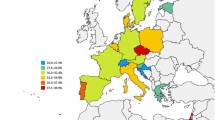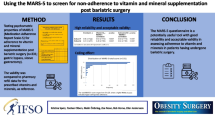Abstract
Background Medication regimen complexity includes various aspects of a regimen, including the dosage form, number of medications and need for additional information for use. Complicated medication regimens cause non-adherence to prescribed medications, making it essential to evaluate medication regimen complexity in older adults to improve adherence to prescribed medications and clinical outcomes. The medication regimen complexity index is currently the most widely used scale for quantifying regimen complexity; however, it has yet to be adopted in Japan. Objective This study aimed to translate the medication regimen complexity index to Japanese and assess its reliability and validity for application in elderly patients in Japan. Setting This study was conducted in a clinic that provides home medical care to patients in the southern part of Ibaraki prefecture, Japan. Method The validation process consisted of translation of the original English version of the medication regimen complexity index to Japanese followed by back-translation to English, comparison of the back-translated and original versions, pilot testing, and assessment of the Japanese version by two raters using the medication regimens of 72 patients with chronic diseases. Main outcome measure The psychometric properties of the index were evaluated according to inter-rater and test-retest reliability, and convergent and discriminant validity. Results The mean age of the 72 patients was 84.3 years. The scale showed high inter-rater reliability (intraclass correlation coefficient 0.946) and test-retest reliability (intraclass correlation coefficient 0.991) for total scores. The number of medications was positively correlated with total medication regimen complexity index score (rs = 0.930, P < 0.001). There were no statistically significant differences between age, sex and Charlson Comorbidity Index and medication regimen complexity index score (P > 0.05). Conclusions The Japanese version of the medication regimen complexity index is a reliable and valid tool for assessing the complexity of medication regimen in Japanese elderly patients.
Similar content being viewed by others
References
Marengoni A, Angleman S, Melis R, Mangialasche F, Karp A, Garmen A, et al. Aging with multimorbidity: a systematic review of the literature. Ageing Res Rev. 2011;10:430–9.
Fried TR, O’Leary J, Towle V, Goldstein MK, Trentalange M, Martin DK. Health outcomes associated with polypharmacy in community-dwelling older adults: a systematic review. J Am Geriatr Soc. 2014;62:2261–72.
Wimmer BC, Cross AJ, Jokanovic N, Wiese MD, George J, Johnell K, et al. Clinical outcomes associated with medication regimen complexity in older people: a systematic review. J Am Geriatr Soc. 2017;65:747–53.
Pantuzza LL, Ceccato M, Silveira MR, Junqueira LMR, Reis AMM. Association between medication regimen complexity and pharmacotherapy adherence: a systematic review. Eur J Clin Pharmacol. 2017;73:1475–89.
Wimmer BC, Dent E, Visvanathan R, Wiese MD, Johnell K, Chapman I, et al. Polypharmacy and medication regimen complexity as factors associated with hospital discharge destination among older people: a prospective cohort study. Drugs Aging. 2014;31:623–30.
Alves-Conceicao V, Rocha KSS, Silva FVN, Silva ROS, Silva DTD, Lyra-Jr DP. Medication regimen complexity measured by MRCI: a systematic review to identify health outcomes. Ann Pharmacother. 2018;52:1117–34.
Wimmer BC, Bell JS, Fastbom J, Wiese MD, Johnell K. Medication regimen complexity and polypharmacy as factors associated with all-cause mortality in older people: a population-based cohort study. Ann Pharmacother. 2016;50:89–95.
George J, Phun YT, Bailey MJ, Kong DC, Stewart K. Development and validation of the medication regimen complexity index. Ann Pharmacother. 2004;38:1369–76.
Okuyan B, Babi B, Sancar M, Ay P, Yucel E, Yucel A, et al. Validation of the Turkish version of medication regimen complexity index among elderly patients. J Eval Clin Pract. 2016;22:732–6.
Pantuzza LL, Ceccato M, Silveira MR, Pinto IV, Reis AMM. Validation and standardization of the Brazilian version of the medication regimen complexity Index for older adults in primary care. Geriatr Gerontol Int. 2018;18:853–9.
Melchiors AC, Correr CJ, Fernandez-Llimos F. Translation and validation into Portuguese language of the medication regimen complexity index. Arq Bras Cardiol. 2007;89:210–8.
de la SaezFuente J, Such Diaz A, Canamares-Orbis I, Ramila E, Izquierdo-Garcia E, Esteban C, et al. Cross-cultural adaptation and validation of the medication regimen complexity index adapted to Spanish. Ann Pharmacother. 2016;50:918–25.
Stange D, Kriston L, Langebrake C, Cameron LK, Wollacott JD, Baehr M, et al. Development and psychometric evaluation of the German version of the medication regimen complexity index (MRCI-D). J Eval Clin Pract. 2012;18:515–22.
Lee S, Jang J, Yang S, Hahn J, Min KL, Jung EH, et al. Development and validation of the Korean version of the medication regimen complexity index. PLoS ONE. 2019;14(5):e0216805.
National Institute of Population and Social Security Research in Japan. Population projections for Japan. (2017): 2016–2065. http://www.ipss.go.jp/pp-zenkoku/e/zenkoku_e2017/pp29_summary.pdf. Accessed April 25, 2020.
Guillemin F, Bombardier C, Beaton D. Cross-cultural adaptation of health-related quality of life measures: literature review and proposed guidelines. J Clin Epidemiol. 1993;46:1417–32.
Charlson ME, Pompei P, Ales KL, MacKenzie CR. A new method of classifying prognostic comorbidity in longitudinal studies: development and validation. J Chronic Dis. 1987;40:373–83.
Koo TK, Li MY. A guideline of selecting and reporting Intraclass correlation coefficients for reliability research. J Chiropr Med. 2016;15:155–63.
Chan YH. Biostatistics 104: correlational analysis. Singap Med J. 2003;44:614–9.
Ferreira JM, Galato D, Melo AC. Medication regimen complexity in adults and the elderly in a primary healthcare setting: determination of high and low complexities. Pharm Pract (Granada). 2015;13(4):659.
Alves-Conceicao V, Silva DTD, Santana VL, Santos EGD, Santos LMC, Lyra DP Jr. Evaluation of pharmacotherapy complexity in residents of long-term care facilities: a cross-sectional descriptive study. BMC Pharmacol Toxicol. 2017;18(1):59.
Elliott RA, O’Callaghan C, Paul E, George J. Impact of an intervention to reduce medication regimen complexity for older hospital inpatients. Int J Clin Pharm. 2013;35:217–24.
Chang WT, Kowalski SR, Sorich W, Alderman CP. Medication regimen complexity and prevalence of potentially inappropriate medicines in older patients after hospitalisation. Int J Clin Pharm. 2017;39:867–73.
Mansur N, Weiss A, Beloosesky Y. Looking beyond polypharmacy: quantification of medication regimen complexity in the elderly. Am J Geriatr Pharmacother. 2012;10:223–9.
Acknowledgements
The authors would like to thank Dr. Johnson George, the developer of the original version of the MRCI, for providing permission to translate the MRCI to Japanese.
Funding
This study was supported by JSPS Grant-in-Aid for Scientific Research Grant Number 19K16940.
Author information
Authors and Affiliations
Corresponding author
Ethics declarations
Conflicts of Interest
The authors declare no conflicts of interest.
Additional information
Publisher's Note
Springer Nature remains neutral with regard to jurisdictional claims in published maps and institutional affiliations.
Rights and permissions
About this article
Cite this article
Masumoto, S., Sato, M., Momo, K. et al. Development of medication regimen complexity index: Japanese version and application in elderly patients. Int J Clin Pharm 43, 858–863 (2021). https://doi.org/10.1007/s11096-020-01185-z
Received:
Revised:
Accepted:
Published:
Issue Date:
DOI: https://doi.org/10.1007/s11096-020-01185-z




